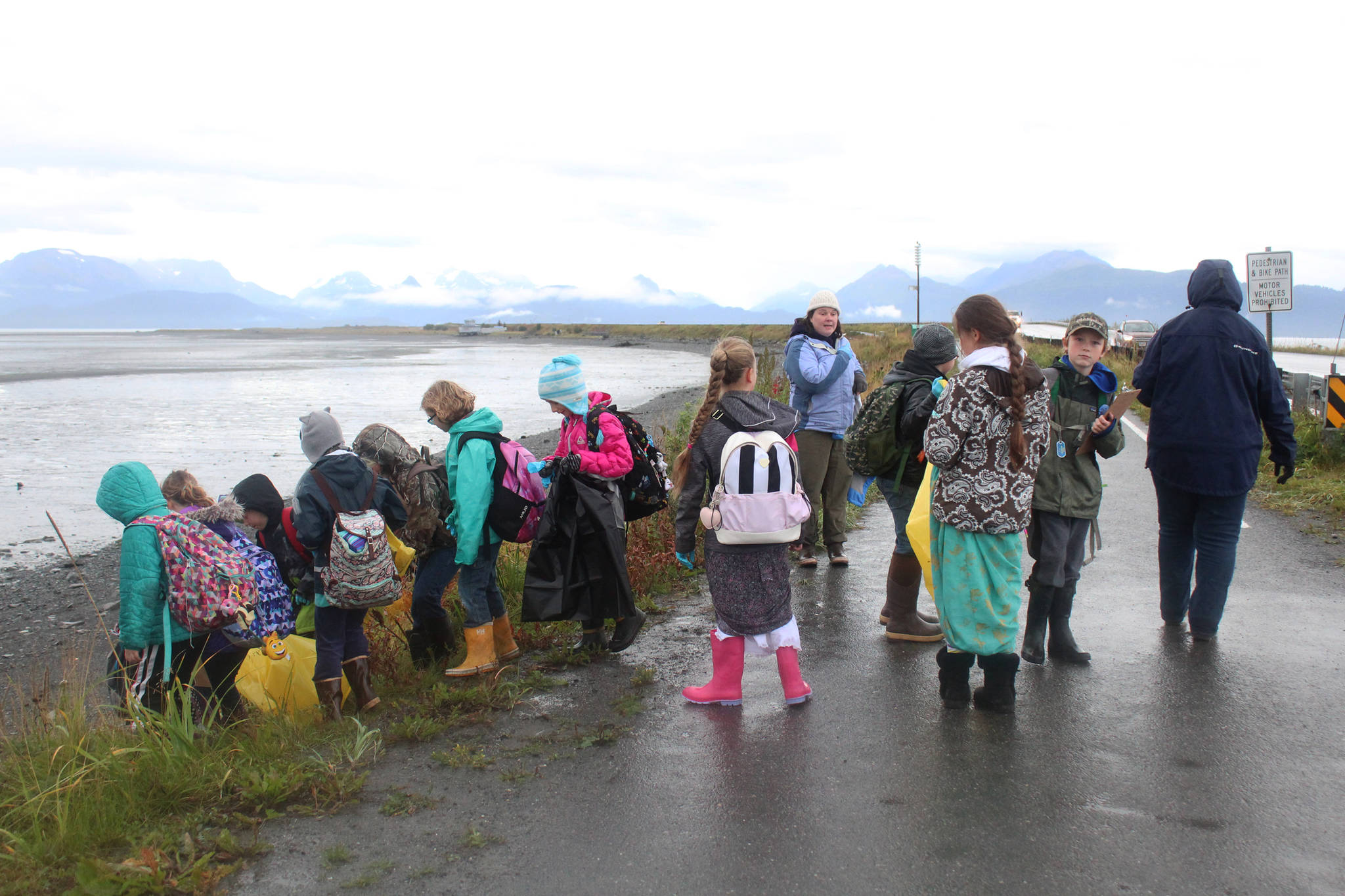Students from McNeil Canyon Elementary School walking the Homer Spit beaches last Friday have become the latest generation of citizen scientists participating in CoastWalk, the annual fall cleanup and beach monitoring project of the Center for Alaskan Coastal Studies. While some kids delight in picking up gross trash, CoastWalk also inspires students to monitor beaches for things like erosion, bird and wildlife sightings, human use and other environmental information.
“Just a general ecological overview,” said CACS marine debris coordinator Henry Reiske about CoastWalk.
Now in its 33rd year, CoastWalk started earlier this month and continues through October. This year’s theme is Take Action Against Ocean Plastic. School groups like McNeil do organized clean-ups and monitoring, but individuals can sign up to monitor one of 32 zones around Kachemak Bay. People can sign up from 9 a.m.-5 p.m. Monday-Friday at CACS on Smokey Bay Way off Lake Street. People also can sign up for a community clean-up at Glacier Spit that runs 10 a.m.-4 p.m. Sunday, Oct. 1, and includes transportation across Kachemak Bay. Reiske also encouraged businesses, nonprofit groups and churches to organize their own group for CoastWalk monitoring.
Kendall Dellasperanza, a third and fourth grade teacher at McNeil, combed the beaches at Mariner Park and across Spit Road on Sept. 22 with her fourth graders. She sent them out armed with trash bags and clip boards to document their findings, all of which get reported back to the Center for Alaskan Coastal Studies.
Reiske said CoastWalk volunteers fill out an International Coastal Cleanup marine debris log sheet as well as a CACS information sheet. The International Coastal Cleanup, a worldwide marine debris cleanup, was held Sept. 14, and CACS uses its data sheets to report on local trash concerns.
Dellasperanza said McNeil Elementary has been sending its students to participate in the CoastWalk for many years, and that it’s a great way for them to learn about community service.
“We really promote community in our school, and this is putting out and doing community service for the whole town, and respecting our environment and appreciating where we live,” she said.
Dellasperanza’s third and fourth grade classes last year went through units on the water cycle and estuaries, so this year’s fourth graders were prepped with the knowledge they needed for the CoastWalk.
“It ties into the whole science aspect of life science and the estuaries and the ocean and all those subjects,” she said.
In 2016, 553 volunteers picked up 233 bags of trash weighing 1,701 pounds total. The low weight reflects a trend on Kachemak Bay beaches where volunteers find items like plastic foam and water bottles.
“We’re seeing a lot of little stuff that doesn’t weigh much,” Reiske said. “Most of our items are Styrofoam, cigarette butts and candy wrappers. … The make up is very different than out at some of the catcher beaches where you’re getting a lot of fishing debris.”
Plastic foam has been an item of local concern, especially across the bay. Volunteers with Cook Inletkeeper last month picked up entire sections of floating docks that had blown loose in storms as well as the plastic foam that had broken loose. Plastic foam, the generic term for the brand name of Styrofoam, also hit bay beaches as a result of the 2011 Japanese tsunami, but not as badly as some other Alaska and other Pacific Coast areas. Tsunami debris seems to have fallen off, Reiske said.
As part of CoastWalk 2017, CACS also has started a new program to discourage people from using single-use plastic bags — a practice the city of Homer banned stores from doing and voters then overturned in a referendum — and encourage people to use reusable bags.
“We’re trying to stress we’re making this problem and can help fight the problem,” Reiske said.
Called the Boomerang Bag project, CACS has been collecting old T-shirts and other fabric to make reusable shopping bags. Sewing workshops will be held to make bags; call CACS for details and to sign up. Boomerang Bags will be stamped with a logo and then given away or loaned at CACS, the Homer Chamber of Commerce, a kiosk on the Spit and at Land’s End Resort.
“The idea is if you forgot your reusable bag, people can come and grab these and use them, and continue to use them or drop them off the next time. That’s the Boomerang idea behind it,” Reiske said.
On last Friday’s clean up, more than the educational benefits, the McNeil students simply have a good time scrambling over rocks and along the shoreline in search of pesky debris that needs to be cleaned up. They take pride in finding large items, like broken off pieces of a boat, and being able to drag them off the beaches, Dellasperanza said.
“There’s always kids that find certain things that they want to keep,” she said. “So that’s always amusing.”
Reach Michael Armstrong at michael.armstrong@homernews.com. Megan Pacer contributed to this article. Reach her at megan.pacer@homernews.com.


